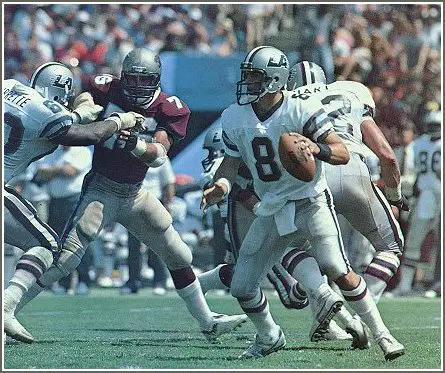 | Los Angeles ExpressYears of existence: 1983-1985 Owner: Bill Daniels, Alan Harmon (1983), J. William Oldenburg (1984) Stadium: Los Angeles Coliseum (92,516) Colors: Express blue, silver, white and burgundy (burgundy and white 1985) Overall Regular Season Record: 21-33 (.389) Overall Playoff Record: 1-1 |
Yearly Standings and Average Home Attendances
1983: 8-10 (19,002)1984: 10-8 (15,361)
1985: 3-15 (8,415)
Of all the teams in the USFL, this one probably caused more headaches for the league than any other. By the end of the 1985 season, the Express were playing in front of intimate gatherings at the huge Los Angeles Coliseum. It got so bad that the Express ended up playing their final home game at Pierce College in the San Fernando Valley. The game drew 8,200 spectators, about double what the Express had drawn the previous two home games.
 L.A. limped through its first season
under former CFL
coach Hugh Campbell. They finished
dead last in rushing, but Mike Rae and Tom Ramsey performed adequately at quarterback. Ricky
Ellis was third in the league with 69 catches for 716 yards. Eric Scoggins and Greg Fields finished
with 12.5 and 10 sacks respectively.
L.A. limped through its first season
under former CFL
coach Hugh Campbell. They finished
dead last in rushing, but Mike Rae and Tom Ramsey performed adequately at quarterback. Ricky
Ellis was third in the league with 69 catches for 716 yards. Eric Scoggins and Greg Fields finished
with 12.5 and 10 sacks respectively.
Prior to the 1984 season, J. William Oldenburg bought the team, and he and general manager Don Klosterman assembled one of the greatest crops of young talent around. Tops on the list was BYU quarterback Steve Young, who signed a whopping $40 million lifetime contract. Young had the benefit of three great young offensive linemen in Mark Adickes, Gary Ruether, and Gary Zimmerman. New coach John Hadl oversaw the talented bunch to a playoff berth and all the way to the Western Conference final. They fell to the Arizona Wranglers, 35-23, but put up a great fight. The future of the Express looked very bright.
Unfortunately, it all unraveled. First, the people of Los Angeles didn't care at all about the team no matter how exciting they might be. Second, some of Oldenburg's financial dealings caught up with him, and he had to surrender the team to the league. The Express were suddenly ownerless. Third, injuries hit the team hard. The Express stumbled through their final year, barely finishing. Without any money to replace injured players and several others playing not to get hurt, the Express sunk to the bottom of the league. It got so bad Young had to play one game at runningback. Not many people in Los Angeles even knew the team died, and Young bought out the rest of his huge contract so he could jump to the NFL.
Their Finest Hour: Perhaps this one should be called the team's finest hours. On June 30, 1984, the Express and the defending champion Michigan Panthers played the longest game in professional football history, a three-overtime, 93 minute and 33 second affair in exhausting heat. Los Angeles moved out to a 10-0 lead on a Tony Zendejas field goal and a Kevin Nelson TD run, but Michigan struck back with two touchdowns before the half to take a 14-10 lead. After the Express cut the deficit to a single point on a third quarter Zendejas kick, an Hebert TD pass early in the fourth put the Panthers out front, 21-13. L.A. finally mounted a drive late in the fourth and scored on another short Nelson run. Young ran left for the two-point conversion and the 21-21 tie. The Express had to sit through not one but two short field goal attempts by Michigan's Novo Bojovic, both of which were missed. Finally, in the third overtime, future kick-returner extraordinaire Mel Gray scampered 24 yards for the winning touchdown. On a day when nothing came easy, Gray broke his arm on the play that gave the Express a 27-21 victory.
Multimedia | | Links | Privacy Policy | Contact Us